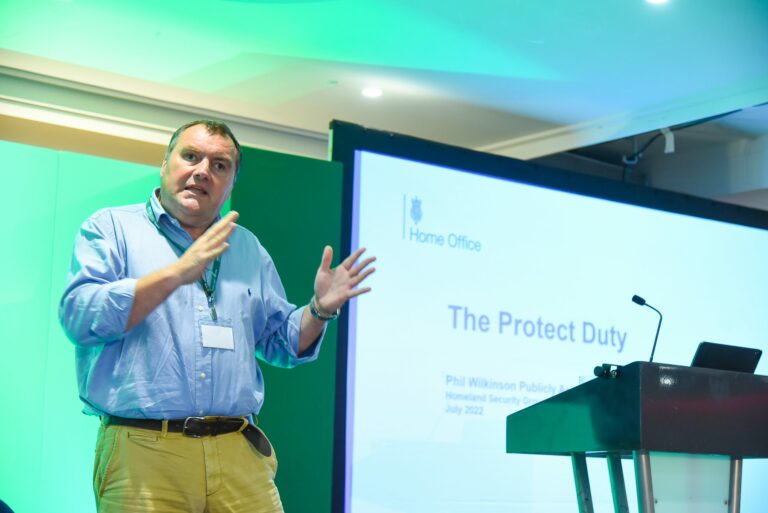Retail Destination Live made an impressive return this summer when it was held in Leicester. Delegates packed the conference room at the Jury’s Inn hotel at Hinckley Island to hear experts cover topics from security to sustainability and everything in between.
Alongside the packed conference agenda was an exhibition where delegates could meet companies face to face and hear about their cutting-edge products and services.
Phil Wilkinson, from the Homeland Security Group (HSG) at the Home Office, kicked the conference off. He said he was hoping to use Retail Destination Live as a soft launch for the new Protect Duty but because of Boris Johnson’s resignation and the leadership contest, the public announcement had been delayed. Instead, he said he would give the audience some pointers on what might be coming their way.
He explained that following the terror attacks at Manchester Arena, Westminster Bridge and London Bridge, as well as the incidents of MPs being attacked in their own constituencies, in 2019 the government launched a review of what it called Crowded Spaces and Places. Wilkinson told the audience he would give a summation of that review.
Firstly, he pointed out that ‘crowded spaces and places’ was changed into something called PALs (publicly accessible locations) or rather any place to which the public or any section of the public has access, on payment or otherwise. It includes everyday locations that are publicly or privately owned and covers high streets, retail stores, shopping centres and markets.
That review was followed by a consultation in 2020. “We got over 2,700 responses to that which I’ve never heard of before from a public consultation perspective, and they ranged from one person writing two lines through to 25 pages from an organisation. That showed us there was a clear legislative need for a Protect Duty,” explained Wilkinson.
“In this country, we’ve never had that before, we’ve relied on the good work of people like yourselves who’ve got a real interest in making sure your areas and locations are safe. And you’ve done a lot of voluntary work. There’s some legislative stuff you do around health and safety, fire safety, things like that. But nothing around security around terror threats has ever really been discussed or performed before. That is going to change. We are in the process of developing policy.”
He confirmed that a Bill would be coming up in November, with legislative and non-legislative requirements.
As Wilkinson went on, he reminded the audience that the key consideration in developing the policy and the Protect Duty was proportionality.
Again, he said he couldn’t go into a lot of detail, but he pointed to consultation results which showed that seven in 10 people agreed or strongly agreed with the concept of a Protect Duty and most thought that publicly accessible locations should fall under the scope of that legislation.
Seven in 10 people also agreed that responsible venues and organisations should prepare their staff to respond appropriately in the event of a terrorist threat. And 83% of respondents to the consultation thought it appropriate for all parties with an interest in security at a venue/space should work together to consider threats.
The over-arching aim of the Protect Duty was to ensure safer places for the public through ‘proportionate protective security and preparedness’ said Wilkinson.
He ended by saying that an inspectorate that promotes and monitors compliance is also being considered with repeated breaches resulting in civil sanctions – but ministers would also consider whether criminal sanctions might be necessary.
This was first published in Retail Destination Fortnightly. Click here to subscribe.


